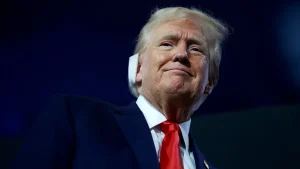Business
Inside Trump’s Plan to Take Kenya’s Sh17B Diaspora Cash and Why Sending Money Home Will Be More Expensive
A draft bill proposed by House Republicans, officially titled the “One Great and Beautiful Tax Bill,” seeks to impose a 5 percent excise tax on all remittances sent by immigrant workers in the US, including green card holders and those with temporary work visas.

President Donald Trump’s administration has unveiled a controversial plan that could siphon nearly Sh17 billion annually from money sent home by Kenyans living and working in the United States, raising concerns about the impact on families who depend on these vital financial lifelines.
A draft bill proposed by House Republicans, officially titled the “One Great and Beautiful Tax Bill,” seeks to impose a 5 percent excise tax on all remittances sent by immigrant workers in the US, including green card holders and those with temporary work visas.
American citizens would be exempt from the tax.
More than 100,000 Kenyans working in the US collectively sent home $2.63 billion (approximately Sh339.17 billion) in 2024, accounting for over half of Kenya’s total remittance inflows.
If implemented, the proposed tax would redirect about $131.46 million (Sh16.96 billion) annually to the US government.
The newest Central Bank of Kenya data shows that diaspora remittances have continued to grow, with Kenyans abroad sending home $1.23 billion (Ksh159.5 billion) in just the first quarter of 2025.
The United States remains the largest source, accounting for 53 percent of all remittances to Kenya.
According to the Central Bank of Kenya, remittance inflows for the 12 months to March 2025 increased by 13.5 percent to $4.972 billion, compared to $4.380 billion in the same period in 2024.
These funds have become increasingly critical to Kenya’s economy.
“These inflows continue to support the current account and the foreign exchange market,” the CBK stated in its latest report.
On a global scale, the World Bank estimates that remittances sent to home countries in 2023 totaled approximately $656 billion, with diaspora remittances now significantly overtaking other types of external financial flows to low and middle-income countries.
The bill, tabled on May 12, 2025, goes beyond just taxing remittances.
It also aims to prevent “taxpayer-funded benefits from indirectly aiding undocumented immigrants” by restricting eligibility for public benefits and tax credits to individuals with verified Social Security numbers.
Additionally, it seeks to eliminate access to Obamacare and Medicare premium tax credits for undocumented immigrants.
Dr. Shem Ochuodho, global chairman of the Kenya Diaspora Alliance (KDA), has condemned the proposal as “unfortunate and discriminatory.”
“It is unfortunate and discriminatory. I haven’t heard anywhere where this happens,” Ochuodho told a local newspaper. “Five percent is quite high. It will go against the spirit of the UN Global Compact on Migration.”
The proposal directly contradicts United Nations objectives that aim to make it easier and less expensive for migrants to send money to their home countries.
The UN has specifically advocated for “faster, safer, and cheaper remittance transfers” to support sustainable development across nations.
International tax experts have raised concerns that the bill violates fundamental principles of taxation by targeting the amount of money transferred rather than the service fee.
“It does not seem to go with the economic principle of taxation because you are literally taking money as a good yet it is the service that you should be taxing,” explained Hadijah Nannyomo, a partner for international trade and indirect taxes at EY.
Nannyomo pointed out that the discriminatory nature of the tax creates loopholes, as people might start using US citizens as intermediaries to avoid the tax.
The legislation is moving quickly through Congress. The House aims to pass the bill by May 26, 2025 Memorial Day with the president’s final signature expected on Independence Day, July 4, 2025.
Under the proposal, remittance service providers would be required to withhold the 5 percent tax on money transfers sent abroad unless the sender can prove US citizenship or legal status.
The collected funds will be submitted to the US Treasury.
The impact could be significant for Kenyan families who rely on these funds for essential needs.
Previous research, including a 2021 Central Bank of Kenya survey, found that remittances primarily support families in purchasing food, household goods, medical bills, and school fees.
The proposed tax also raises concerns about Kenya’s currency stability.
Remittance inflows have been instrumental in easing pressure on the Kenyan shilling by supporting the supply side of dollars against import demands.
Any reduction in these inflows could potentially destabilize the exchange rate, affecting not just recipients of remittances but the broader Kenyan economy.
The news has rattled immigrant communities across the United States, especially Africans whose home nations depend heavily on remittances to shore up their economies.
This would represent a significant policy reversal, as remittances have historically not been taxed in the US.
Critics argue that the measure unfairly targets immigrant communities that contribute significantly to both the US and their home countries’ economies, potentially creating far-reaching economic consequences for developing nations like Kenya.
Kenya Insights allows guest blogging, if you want to be published on Kenya’s most authoritative and accurate blog, have an expose, news TIPS, story angles, human interest stories, drop us an email on [email protected] or via Telegram
-

 News2 weeks ago
News2 weeks agoTHE FIRM IN THE DOCK: How Kaplan and Stratton Became the Most Scrutinised Law Firm in Kenya
-

 Economy2 weeks ago
Economy2 weeks agoIran Demands Arrest, Prosecution Of Kenya’s Cup of Joe Director Director Over Sh2.6 Billion Tea Fraud
-

 Grapevine1 week ago
Grapevine1 week agoA UN Director Based in Nairobi Was Deep in an Intimate Friendship With Epstein — He Even Sent Her a Sex Toy
-

 Business2 weeks ago
Business2 weeks agoKPC IPO Set To Flop Ahead Of Deadline, Here’s The Experts’ Take
-

 Politics2 weeks ago
Politics2 weeks agoPresident Ruto and Uhuru Reportedly Gets In A Heated Argument In A Closed-Door Meeting With Ethiopian PM Abiy Ahmed
-

 Investigations1 week ago
Investigations1 week agoHow Mexico Drug Lord’s Girlfriend Gave Him Away
-

 Business2 weeks ago
Business2 weeks agoSafaricom Faces Avalanche of Lawsuits Over Data Privacy as Acquitted Student Demands Sh200mn Compensation in 48 Hours
-

 Investigations1 week ago
Investigations1 week agoHow Close Ruto Allies Make Billions From Affordable Housing Deals


















